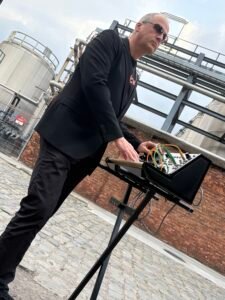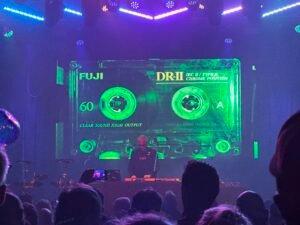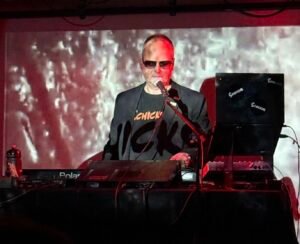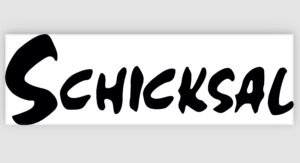Every year, Barcelona’s Ombra festival manages to surprise me with some unexpected names on its line-up. This year, it was the confirmation of Belgian producer Schicksal, known for his New Beat hit ‘24 hours’, which excited me the most. Recently, two labels have shown us that his production goes beyond the classics of the late 1980s, releasing several compilations featuring compositions that will delight fans of EBM and minimal synth. We spoke to Rudi Huybrechts about his beginnings, the birth of New Beat, his performance at Ombra and the eternal search for the ‘perfect body beat’.
 —Being Belgian, why did you use a German word (meaning Fate) for your project?
—Being Belgian, why did you use a German word (meaning Fate) for your project?
—Making music with machines and computers can sound cold. From the start, I intended to infuse my music with emotion and melody. So, I looked for a project name that radiated emotion. I quickly settled on the word fate or destiny. Because I strongly believe that every individual can take control of their own destiny and largely determine their own future.
Since I was into Neue Deutsche Welle and DAF at the time, I looked up the German word for fate. You have to admit, Schicksal is such a beautiful word. It’s a word that you can’t help but pronounce with emotion.
—You said that Alles Ist Gut was the album that made you want to make music. What did you find so special in that record?
—The album Alles Ist Gut just blew my mind the first time I listened to it. I know perfectly where I was, it was in the living room of our house. My parents just bought a new hi-fi system and the sound was great for that time.
For me, DAF stripped electronic music down to its bare essence: no melody layers, no harmonies, no guitars. Just drums, bass synth, and a voice. It’s rhythm driven, repetitive but also human and physical. The true definition of Electronic Body Music for me.
—Two other two albums that you have confessed that they were important for you were Geography and Autobahn, what did you learn from them?
—The release of Front’s Geography in 1982 is for me a true landmark. This was the first time where synth music had this kind of aggression, passion, and groove. Front 242 used synths in a way which was never done before. There was raw energy, especially captivated in songs like “Operating tracks” and “U-men”. Still of my favourite tracks all-time, so glad they performed those live the last years they toured.
Computerworld: The precision and clean sounds of Kraftwerk on their best! Pure, bright, mathematical. But still with a human heartbeat and hypnotic earworm melodies. Remember, this album is from 1981, but the way they predicted the future and described it almost perfectly is astonishing Released before the internet, before home computers became common, it already foresaw a society run by data, networks, and surveillance.
—Your first synthesizer was a Roland SH-101, bought when you were only 15 years old. It’s a synth that has become really famous with the years. Why did you choose that one to start with? It was not an expensive synth at the time, right?
—The first synthesizer I bought was a Roland SH 101. There was no strategy behind this purchase. It was simply the only synthesizer I could afford 🙂 But what a machine it turned out to be! Very intuitive to use, uncomplicated design, and a great fat sound. It’s no coincidence that this Roland formed the basis of the synthwave sound of the 1980s. That’s the common thread in my favourite creative process: no complex machines, just a limited setup that I try to get the most out of.
—Your first songs appeared in a compilation of Belgian label Climax. with a lot of others Belgian electronic projects. How was the scene back then?
—Yes, my first songs were initially released on cassette on the Climax label. This was the label of a musician friend from the same municipality of Hoboken as me. Incidentally, I also play these first two songs, “Time” and “Saturday”, live on Ombra. We lived near the city of Antwerp and tried to sell our cassettes there through various trendy clothing stores and record shops. That was our distribution channel and marketing model.
—There is a new interest in all those sounds nowadays, and we have label like Valhalla, Mecanica, Vinyl On Demand or Minimal Wave released material from those years. Also, the influence of the music of the period can be heard in a lot of new bands. What do you think that it’s so appealing in 80s electronic music?
—The 1980s seem so close, but they are actually already longtime behind us. It is no coincidence that music from the 1980s is still popular and constantly played on the radio. Not only in original versions, but also in covers. I think the 80s really caused a shift in the way music was made and the way music was viewed. The classic four-piece lineup of drums, bass guitar, rhythm guitar, lead guitar, and vocals was being shaken up. Everything became possible with the use of electronic instruments such as synthesizers, sequencers, and drum computers. The traditional music scene, certainly in Belgium, wasn’t really ready for this and tried to hold it back. Let them laugh and try, but it can’t be stopped; the music world will never be the same again. Everything is possible, everything is different.
Discovering new music in the 1980s was completely different from today. Of course, there was no internet, no social media, no Spotify with algorithms. I was lucky that there were a number of alternative radio stations in Belgium that played innovative new electronic music. That’s how I discovered a lot of interesting bands. Antwerp’s nightlife also had a number of obscure clubs where you could discover this kind of music. This was also the place where you could meet like-minded souls. Record stores and concerts also ensured that we could meet each other and develop ideas for collaborations.
alternative radio stations in Belgium that played innovative new electronic music. That’s how I discovered a lot of interesting bands. Antwerp’s nightlife also had a number of obscure clubs where you could discover this kind of music. This was also the place where you could meet like-minded souls. Record stores and concerts also ensured that we could meet each other and develop ideas for collaborations.
—In Perpetuum Cycle I, released by Mecanica, you included tracks from 1983 to 1987, just before the release of your first single. The music is something between EBM (Ride Across The Desert) and minimal synth (Body Beat). All this material was recorded in your own “home studio”, right?
—Nowadays, there is a lot of talk about living room musicians. Schicksal is actually a bedroom musician :-). Imagine my small bedroom, I estimate 3 m × 2.5 m. To get started, I first had to make my bed. Then I laid everything out on the bed, connected it to a mixing console and my stereo system. I recorded everything on C 90 cassettes.
—I guess that some of the material from those cassettes appeared in Perpetuum Cycle II another compilation from Mecanica, that encompassed a larger period, from 1983 to 19991 with tracks with a sound closer to New Beat. Do you still have unreleased material from that time? Can we expect more compilations in the future?
—Fortunately, I was able to keep all those cassettes in good condition. There may still be a few gems on them…
—You said that you created music in “waves”, during periods. Did those waves correspond with moments of your personal life?
—It’s true that creating music and playing music is a process of coming and going in my life.
In some periods, I feel no urge or inspiration to do so, while other periods are rather intense. This is usually directly related to events in my life. The big themes such as love, sadness, death, and joy are usually the triggers.
—You said that during the late 80’s, some DJ’s in Antwerp nightclubs such as ‘Prestige’, ‘Berchem Palace’ and ‘Rudy’s Avant Garde’ in Sint-Niklaas started pitching songs and playing downtempo dance music. Can you please tell us a bit more about this? Was this an influenced for “24 hours”?
—At the end of the 1980s, the New Beat genre emerged: slow, hypnotic beats usually inspired by electro songs from the past. Quite by chance, my song “24 Hours” fit into this genre, and I was able to ride the incredible underground hype that was happening in Belgium at the time.
The nightclubs you mentioned were in no time, real New Beat temples. People came from far and wide to have fun and dance to this New Beat. But as always, it came to an end. New Beat became more and more mainstream and moved further and further away from the original concept. New Beat was commercially exploited, the start of the end… Still, I have very fond memories of this period. It ensured that, through the song “24 hours”, Schicksal became better known,
 —There is an “acid” version of “24 Hours” included in your first 12″, was it as style that also interested you?
—There is an “acid” version of “24 Hours” included in your first 12″, was it as style that also interested you?
—Aha, the first time someone has asked me about this, nice! For me, acid is a subgenre that has received too little attention. Fortunately, perhaps… It probably triggers me because of its simplicity. A drum computer linked to the Roland TB 303 is the basis, just fantastic! This is another example that shows that good music doesn’t have to be complex. By the way, I still have a few acid songs by Schicksal on my cassettes, who knows…
—You wrote a song called “Fate” that appears in the reissue of 24 Hours. I think that’s the most modern music that you have released. Being the “translation” of your artist name, did you try to do a track that define your new sound?
—You’ve noticed that correctly. The song “Fate” still gives me goosebumps when I perform it live. There are few songs that I’m as satisfied with as this one. The sounds, the melody, the tight drumbeat. It’s a song that is very close to my heart, written during a period in my life when fate played an important role.
—In an interview, you said that, some time ago, you got a Korg MS-20 and a Korg Volca Bass, but before you were making music with your computer. Do you prefer analogue to digital?
—That’s a tricky question! I’m not a purist when it comes to this. I prefer the accessibility of digital combined with the ease of use of rock-solid analogue material.
—How would you describe the “perfect body beat”?
—For me, the perfect body beat is a combination of rhythm, emotion, dance, and melody. The perfect body beat is driven by a motive, an ambition, a goal, a dream, and a destiny. Hopefully, I’ll never find them because the journey to get there is so beautiful.
—It was during a concert of Hammershoi, a band that we like a lot (they split if I am not wrong) that you desired to tour again. Can you please tell us more about this?
—The desire to perform again returned rather coincidentally: I frequently attend concerts and festivals. It was at one of those performances at the Djingel Djangel venue, in Antwerp, that I discovered Hammershoi. Young talent and super sound! I started chatting with one of the organizers of BIMFEST (who were also present that evening) to promote Hammershoi as a candidate for that festival. When I introduced myself as Schicksal, it turned out that they had once (in 1986, I guess?) organized an evening where I performed (as the opening act for Klinik in a club somewhere in Kalmthout). Talk about coincidence! People started pulling my sleeve to get me to perform again, after all these years. When I heard that DAF was scheduled to headline BIMFEST, I didn’t have to think twice :-). Only afterwards did I realize what I had gotten myself into: transferring all the old tracks and reprogramming them in a software program, combined with creating attractive visuals as a backdrop… my weekends were pretty full!
—What can we expect of your concert at Ombra Fest?
—The setlist for my performance at Ombra is diverse. On the recommendation of many, the emphasis is on my old songs from the 1980s. In addition, I will play a few covers and some newer songs. I hope this will give a good impression of what Schicksal stands for. I am very curious about the reactions of the Ombra audience. Ombra is definitely one of the top festivals on my bucket list because Schicksal and Ombra have a lot in common. Ombra has a very strong history of having diverse and interesting acts, something I admire. Every year there are a lot of Belgian visitors, and they all tell me that Ombra is something for Schicksal. Even the industrial venue throws me back to my early years when I grew up in the industrial town of Hoboken, such an inspirational place!
For me, the interaction with the audience is crucial. Their energy fuels my energy. Their enthusiasm gives me enthusiasm. It is sure to be a memorable evening!


